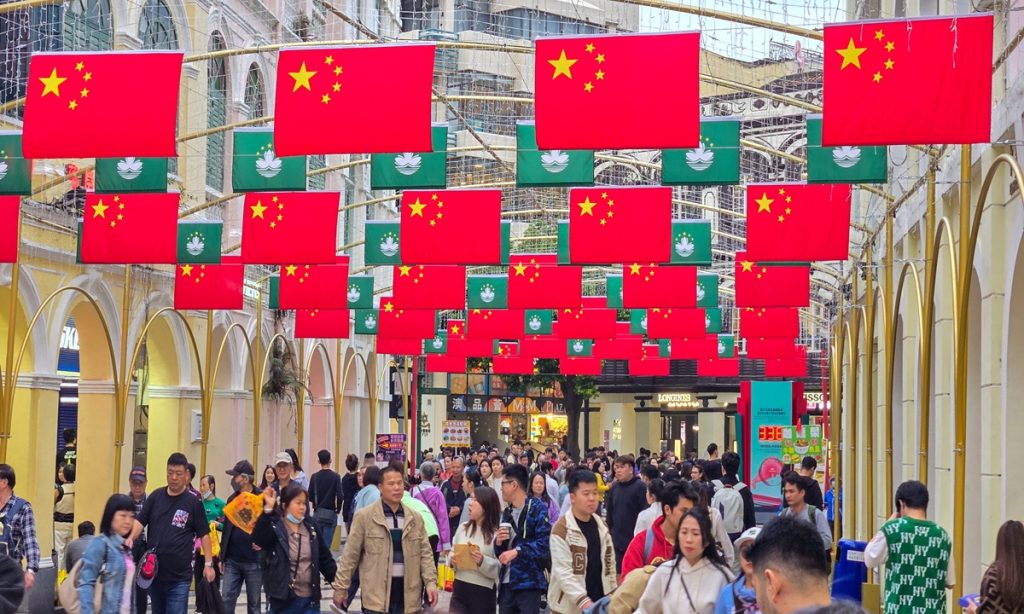Macao’s development a success story of ‘one country, two systems’: legal expert

Editor's Note:
December 20, 2024, marks the 25th anniversary of Macao's return to the motherland. It not only signifies the ended centuries of Portuguese occupation, but also heralds the beginning of a new chapter for Macao Special Administrative Region (SAR).
On this momentous day, those who witnessed this grand event 25 years ago are filled with emotions. With excitement, they shared their memories with the Global Times, recounting the development and changes in Macao since its return and highlighting precious historical details. Their experiences serve as a testament to the enduring emotional connection and consistent, firm direction of development between Macao and the mainland.
This story is also part of the Global Times' "Witness to History" series, which features first-hand accounts from individuals who were at the forefront of historic moments. From scholars, politicians, and diplomats, to ordinary citizens, their authentic reflections on the impact of historical moments help reveal a sound future for humanity through the solid forward steps taken in the past and the present.
Luo Weijian, a law professor at the University of Macau, views the return of Macao to the motherland and the successful implementation of "one country, two systems" in the city as defining chapters in his life.
His involvement - as a member of the secretariat of Drafting Committee for the Basic Law of the Macao SAR, the Chinese representative of Sino-Portuguese Joint Liaison Group, and a member of the Preparatory Committee of the Macao SAR of the National People's Congress - has placed him at the heart of this transformative journey.
From conception to completion
Reflecting on the historic moment of Macao's return 25 years ago, Luo was struck by a poignant photo album. Among the images, one stood out: Macao residents brandishing a vast banner adorned with a single, powerful phrase in Chinese - "Returned."
"The image was stark yet profound, devoid of flamboyant eloquence, yet brimming with raw sentiment. It resonated with the simplicity of a child, long separated from his mother, on the verge of reunion; not articulating flowery expressions of enduring love, but rather, crying out with unadorned emotion," Luo remarked,
Luo recalled the trepidation that gripped through the people of Macao before the handover. "Macao faced twin challenges: A precipitous decline in public security, with crime syndicates brazenly enacting violence and arson in broad daylight, as the Portuguese authorities' departure loomed and their governance waned. Concurrently, the economy was in a tailspin, with a downward spiral since 1996 that persisted until the return."
Despite these concerns, Luo highlighted the enduring faith of citizens in Macao toward their motherland.
"The Macao compatriots harbored a steadfast belief that with the advent of a special administrative region government of their own, they were poised to surmount these adversities."
"There was no wave of emigration after Macao's return, indicating that the people in the SAR have confidence in the country," Luo stressed.
In the summer of 1988, as Luo stepped onto Macao's soil for the first time, he embarked on a historic mission: To craft the Basic Law of the Macao SAR. "The Basic Law was not just a legal document; it was the blueprint for Macao's future and the safeguard of its people's interests," Luo reflected. "We were committed to including the voices and insights of the Macao community in this foundational process."
"The journey from conception to completion of the Basic Law spanned 4 years and 5 months, and throughout this period, we engaged in three extensive public consultations, ensuring that the Basic Law resonated with the will of the people across the nation," Luo detailed.
With the Macao's Basic Law passed on March 31, 1993, Macao entered a critical post-transition phase. Luo highlighted the challenges of this period, particularly in building a civil service team that reflected Macao's demographic reality. "Initially, Macao's mid-to-senior civil service positions were predominantly occupied by Portuguese officials. Through concerted efforts, by the time of the 1999 handover, 90 percent of these roles were staffed by local Chinese residents who were deeply invested in Macao's progress. The judiciary also saw the rise of locally trained officials since 1988, the Faculty of Law of the University of Macau has been established to offer localized legal courses."
Luo pointed out that Sam Hou Fai, the Chief Executive-elect of the Macao SAR, who had joined Macao's first cohort of judicial auditors in 1995 and later presided over the Court of Final Appeal before his election campaign, was shaped by such a judicial training system.
The local legislature's unwavering dedication to national security and the well-being of Macao's residents since the city's return to China in 1999 has ensured social stability in Macao over the past 25 years, he said.
A demonstrative role
Luo considers himself both a practitioner and a beneficiary of the "one country, two systems" practice.
"Macao's implementation of 'one country, two systems' has not only been a success story but also a model for others to follow," he said.
In his daily interactions with students and residents, Luo has witnessed a profound respect for the policy that underpins Macao's governance.
"There's a clear understanding that the concept of 'one country' serves as the bedrock, supporting two social systems. This principle is not just acknowledged but deeply ingrained in Macao's society," he observed.
The past quarter-century has seen Macao flourish, thanks to the support of the motherland. Once stereotyped as a "casino city" and a setting for gangster films, Macao has reinvented itself as a dynamic economic hub. It is now lauded for its robust economic growth, low crime rates, and its commitment to public welfare, garnering global recognition.
"Macao's development has been a success story of 'one country, two systems' and such success withstood the test of history," Luo emphasizes.